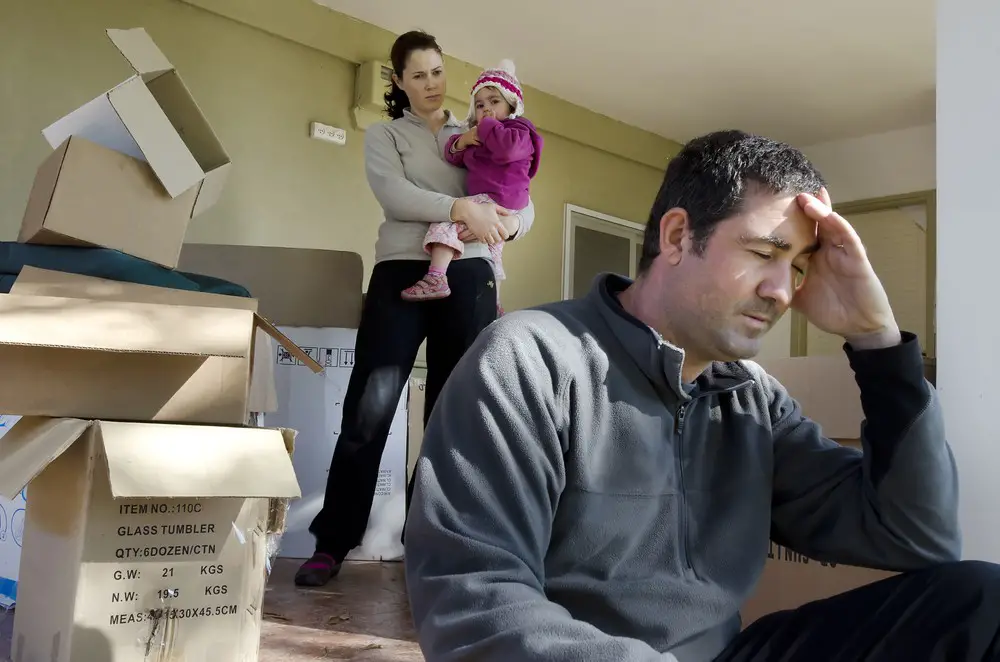As a BetterHelp affiliate, we receive compensation from BetterHelp if you purchase products or services through the links provided
After going through a divorce, you might wonder if it’s possible to share a bed with your ex-spouse again. The process of getting a divorce can be very stressful, and figuring out how to navigate your relationship after it can be equally challenging. It’s natural to think about the possibility of rekindling your physical relationship with your ex-partner.
There’s a lot to think about. Relationships post-divorce are as varied as snowflakes—no two are alike. Some divorced pairs might keep the emotional flame alive, while others would rather walk over hot coals than see each other again. Beyond that, hopping back into bed together comes with its own set of real-world and emotional complications.
Key Takeaways:
- The sleeping situation between divorced couples is far from a one-size-fits-all affair.
- Your mental and emotional well-being should be front and center when weighing the pros and cons.
- Don’t forget to consider how this could affect the kids and your future love life—it’s a package deal of complexities requiring a lot of thought.
So, before you slide back under the sheets with your ex, give these points a good ponder. You never know; the answers might surprise you.
 Dynamics Between Divorced Couples
Dynamics Between Divorced Couples
After a divorce, you might wonder if divorced couples can maintain a platonic relationship. When ending a committed relationship, various factors can affect the dynamics between two individuals.
It’s essential to recognize that each couple’s situation is unique. Some remain close friends after their breakup, while others struggle to maintain connection. Here are a few possible scenarios:
- Amicable Split: If the divorced couple had a friendly separation, they are more likely to maintain a healthy relationship. This can sometimes lead to rekindling a physical connection as well.
- Co-Parenting: Couples with children may need to maintain communication, cooperation, and respect for their children’s well-being. This mutual goal can create a bond that sometimes results in intimate moments.
- External Relationships: In some cases, one or both individuals may enter new relationships after divorce. This development can help or hinder the dynamic between divorced couples, depending on the new partners’ level of understanding and acceptance.
When considering these dynamics, it’s vital to respect individuals’ emotional and physical boundaries. Mutual consent is crucial if a romantic relationship is to be reestablished, even if it’s only temporary.
You should also remain mindful of the potential complications from re-engaging in a physical relationship with an ex-partner. For instance, unresolved issues from your previous committed relationship might resurface, or new partners might feel betrayed or threatened by a continued connection.
In summary, divorced couples can share a bed again, but the dynamics between them are complex, and potential risks must be weighed against the benefits. Open communication and emotional honesty with your ex-partner, yourself, and any external relationships will be the key to navigating these murky waters.
Sleeping Arrangements After Divorce
 Continued Shared Sleeping
Continued Shared Sleeping
It may surprise you, but some divorced couples opt to continue sharing a bed due to emotional closeness or financial reasons. Putting their differences aside, they maintain this arrangement and focus on getting a good night’s sleep. While convenient, you must know that this setup can become complex, especially with new partners entering the picture.
Key takeaway: Shared sleeping post-divorce is possible but can be challenging for a long time.
Switch to Separate Beds
Switching to separate beds within the same room is a popular choice for some divorced couples living together. This arrangement lets both parties enjoy better sleep and personal space without moving to separate rooms. Opting for separate beds can create a sense of independence and security, allowing each person to move on peacefully.
Key takeaway: Separate beds in the same room promote independence and better sleep.
Separate Rooms Arrangement
Taking it further, most divorced couples choose to move into separate rooms entirely. This arrangement provides the highest level of privacy and independence, allowing both parties to live more like roommates than former spouses. A separate room setup benefits everyone involved by eliminating awkwardness and creating a healthier environment for personal growth.
Key takeaway: Separate rooms are the best way to establish independence and maintain healthy boundaries post-divorce.
Effects on Mental and Emotional Wellbeing
As you navigate the complex dynamic of sleeping together after a divorce, it’s essential to consider the possible effects on your mental and emotional well-being. Engaging in post-divorce intimacy can bring about various emotions such as guilt, resentment, anxiety, and shifts in mood.
Developing a clear line of communication can help you maintain a sense of clarity and understanding in this delicate situation. Open and honest conversations with your ex-spouse will enable you to express your feelings and desires and set any necessary boundaries to protect your emotional health.
Intimacy after divorce might raise guilt, especially if one or both parties are in new relationships. It’s essential to consider the potential consequences for everyone involved, including your current partner(s), and prioritize transparency and honesty in your interactions.
Resentment can also arise if the decision to share a bed is not mutual. In this case, addressing your feelings openly and honestly is crucial, rather than allowing them to fester and potentially cause more emotional harm down the line.
Another key factor to consider is the impact of anxiety on your emotional well-being. You may feel on edge or stressed due to the unfamiliar territory that comes with post-divorce intimacy. Taking a step back to analyze your feelings and engaging in self-care practices can be valuable in managing anxiety levels.
Mood shifts and emotional upheaval can be expected, as your feelings towards the new dynamic fluctuate. In these circumstances, it’s essential to regularly reflect on your emotions and consider seeking support from friends, family, or a mental health professional.
In conclusion, navigating post-divorce intimacy can be a complex and emotionally charged experience. By maintaining open lines of communication, being aware of potential issues like guilt, resentment, and anxiety, and seeking support as needed, you can better protect your mental and emotional well-being during this time.
Impact on Children and Future Relationships

When you consider the possibility of sleeping with your ex-spouse after divorce, it’s essential to think about how this decision might affect your children and future relationships. Weighing the pros and cons and considering the possible consequences can help avoid unnecessary complications in the long run.
Children, especially young ones, may become confused about their parents’ relationship status if they witness intimate actions between them. The mixed signals can lead to emotional turmoil and negatively impact their overall well-being. They might struggle to understand why you’re no longer living together but still engage in intimate activities.
- Tip: Always be mindful of how your actions can shape your children’s perception of healthy relationships. Set clear boundaries and explain that Mom and Dad are not getting back together despite the occasional physical closeness.
Another aspect to consider is how this arrangement may affect your future relationships. New romantic partners might feel threatened or uncomfortable knowing you still maintain a physical connection with your ex-spouse. This could result in trust issues, jealousy, and discord in your new relationship.
- Strategy: Be honest with potential romantic partners about your past, and make sure they understand your current relationship with your ex-spouse, if any, to avoid surprises later on.
Furthermore, engaging in physical relations with your ex-spouse can alter your social status within your circle of friends and family. They may question your decision-making or feel concern for your well-being. It’s essential to consider how your actions impact not only yourself but others around you as well.
- Key takeaway: While it may be tempting to maintain physical intimacy with your ex-spouse for various reasons, it’s crucial to consider the potential effects on your children, future relationships, and social status. Open communication, honesty, and clear boundaries can help navigate these challenges and maintain healthy relationships.
Challenges and Solutions
Creating Boundaries
Establishing clear boundaries is crucial when navigating the complex situation of divorced couples sleeping together. You might be tempted to blur the lines, but maintaining these boundaries can help reduce anxiety and potential conflicts. Consider discussing expectations and ground rules early on, such as:
- Establishing separate living spaces
- Limiting physical contact
- Discussing potential romantic partners
By setting up solid boundaries, you can ensure that you and your ex-partner are on the same page and avoid misunderstandings.
Fostering Communication
Open and honest communication is essential for divorced couples in any situation. When it comes to still sleeping together, this communication is paramount. Regularly discussing your feelings, concerns, and expectations is important to gauge each other’s comfort level. Here are a few tips:
- Schedule regular check-ins to reassess the situation
- Encourage openness and mutual empathy
- Practice active listening skills
By cultivating a culture of communication, you can better understand and support one another through this difficult period.

Counseling and Therapy
Therapy, including couples counseling, can provide the necessary support to navigate the challenges of divorced couples sleeping together. It can help address any lingering issues, as well as anxiety, and facilitate constructive discussions. Remember that:
- Professional guidance can offer valuable insights and coping strategies
- Individual therapy can complement couples therapy
- It’s never too late to seek professional help
Connecting with a therapist or counselor can equip you with the tools to work through the complexities of your unique situation.
Sleeping Disorders and Coping Mechanisms
Sleeping disorders can significantly impact the lives of divorced couples who still sleep together. Both partners must address any sleep disorders they may be experiencing to improve their sleep quality and maintain a healthy relationship. This section will discuss identifying disorders, adjusting the sleep environment, and seeking medical interventions.
Identifying Disorders
If you or your partner are experiencing interrupted sleep, it’s essential to recognize the root cause. Common sleep disorders include:
- Insomnia: Difficulty falling asleep or staying asleep.
- Sleep apnea: Interrupted breathing during sleep, often accompanied by snoring.
- Restless legs syndrome: An irresistible urge to move one’s legs, disrupting sleep.
- Obstructive sleep apnea: A type of sleep apnea caused by a blocked airway.
Key takeaway: Identifying specific sleep disorders will guide you in finding the right treatment and coping strategies.
Adjusting Sleep Environment
Once you’ve identified any sleep disorders, it’s time to adjust your sleep environment to ensure a better night’s rest. Here are some tips to consider:
- Maintain a consistent sleep schedule, even if you and your partner have different preferences.
- Use earplugs or white noise machines to block out snoring or disruptive sounds.
- Create a comfortable and clutter-free bedroom with appropriate lighting and temperature settings.
- Address any congestion, allergies, or other conditions that may disrupt sleep.
Key takeaway: A soothing sleep environment can significantly improve sleep quality and strengthen relationships.
Medical Interventions
When lifestyle adjustments aren’t enough, seeking medical interventions for sleep disorders may be necessary. Some potential options include:
- Scheduling a consultation with a sleep doctor to discuss your symptoms and suggest suitable treatment.
- A CPAP machine for sleep apnea maintains an open airway and reduces snoring.
- Exploring prescription medications for insomnia or restless legs syndrome under a doctor’s guidance.
Key takeaway: Seeking professional help can provide tailored solutions for your sleep disorders, ultimately leading to a healthier, more harmonious sleeping arrangement.
Consequences and Effects of Sleep Arrangements

When you decide to sleep separately from your ex-partner, it’s essential to consider the possible consequences and effects of the sleep arrangements you choose. In this section, we will discuss three main aspects to keep in mind: the impact on physical health, emotional consequences, and effects on personal life.
Impact on Physical Health
First, consider the toll such arrangements might take on your physical health. A so-called “sleep divorce” can have both positive and negative effects. For some people, sleeping apart may lead to better sleep quality, as factors like snoring or different sleeping schedules will no longer result in sleep disturbances. However, if the separate arrangement involves an uncomfortable sleeping surface or sharing body heat is preferred, physical discomfort might result.
- Sleep Quality
- Snoring and sleep disturbances
- Comfort of sleeping surface
- Body heat preferences
Emotional Consequences
Next, consider the emotional consequences that may arise from sleeping apart. On the one hand, it could lead to a sense of relief and reduced stress by not compromising your preferred sleeping environment. Conversely, you may experience feelings of loneliness or separation anxiety, especially if your relationship was initially built on a foundation of emotional intimacy and closeness.
- Relief and reduced stress
- No need to compromise on personal preferences
- Potential feelings of loneliness
- Separation anxiety
Effects on Personal Life
Finally, examine how your sleep arrangements may impact your personal life. A typical consequence of sleeping apart is a more defined sense of personal space and clear boundaries, which can lead to an increased sense of independence and autonomy. This independence can foster self-confidence and may even yield benefits in other areas of your life, like your career or personal relationships. However, it is also crucial to recognize that such arrangements might raise questions or judgments from friends, family, or colleagues, leading to potential social implications.
- Clearly defined personal space
- Increased independence and autonomy
- Improved self-confidence
- Potential social implications
Remember to weigh the pros and cons carefully when deciding on sleep arrangements with a divorced partner, considering your physical health, emotional well-being, and the impact on your personal life.
 Do You Need Therapy? Signs to Look For
Do You Need Therapy? Signs to Look For
Before jumping back into bed with your ex-spouse, assessing whether you could benefit from professional guidance might be helpful. Therapy can offer a safe space to explore emotions, confront unresolved issues, and set healthy boundaries. So, how do you know if it’s time to seek help? Here are a few signs:
- Emotional Rollercoaster: You find it challenging to manage your emotions when around your ex.
- Communication Breakdown: Every conversation with your ex becomes an argument or silent standoff.
- Blurred Boundaries: You’re not sure where the line between friendship and intimacy lies.
- Impact on Daily Life: Thinking about or interacting with your ex affects your work, friendships, or health.
If any of these hit home, maybe it’s time to consult a professional. Therapy can be a game-changer, equipping you with the tools you need to move forward—whether back into the same bed or far away from it.

Setting Goals: What Do You Want?
Before making any decisions, it’s crucial to set some goals. Think about what you want and what you’re willing to tolerate. Are you seeking emotional support, companionship, or a way to navigate co-parenting? Your goals will steer the relationship’s direction and set the tone for what’s to come.
- Short-Term Goals: What are you looking to achieve immediately? Perhaps you need a sounding board or a co-parenting ally.
- Long-Term Goals: Consider your objectives for the future. Do you see yourself reconciling, or is this a temporary arrangement?
- Deal-Breakers: Identify what you’re unwilling to accept—this could be anything from jealousy to inconsistent communication.
Monitoring Progress: Keep Tabs on Your Wellbeing
After you’ve set your goals, tracking how things are going is essential. Regular check-ins with yourself (and perhaps your therapist) can help assess whether the arrangement works. Here are some key performance indicators:
- Emotional Health: Do you feel happier, more anxious, or maybe indifferent since resuming the sleeping arrangement?
- Compatibility: How well are you and your ex getting along now that you’ve re-entered this intimate space?
- Impact on Others: Has the relationship had any noticeable effects on your children, family, or even potential future partners?
Remember, if things don’t seem to be panning out as you’d hoped, it might be time to reassess. After all, the goal is to improve your life, not make it more complicated.
So there you have it. Before dusting off that extra pillow for your ex, take time to introspect, set goals, and monitor your wellbeing. It’s a delicate dance, but with the right steps, you can find your rhythm—whatever that may be.
Frequently Asked Questions

Can sleeping with an ex-spouse affect legal proceedings?
Yes, it can. Sleeping with your ex-spouse may complicate the legal proceedings if you’re going through a divorce. For example, it could be used as evidence of adultery or cohabitation, which might impact alimony and custody arrangements. Always consult with your attorney before engaging in any post-separation intimacy.
What are the emotional implications of sleeping with an ex-spouse?
Sleeping with an ex-spouse can bring up a mix of emotions. You might experience feelings of nostalgia, sadness, or even temporary relief from the pain of the breakup. However, engaging in such intimacy can also lead to confusion about your relationship, ultimately hindering your ability to move on and heal. Considering the emotional risks before becoming physically involved with an ex-spouse is essential.
Does sleeping together indicate reconciliation after divorce?
Not necessarily. While some couples may sleep together as a step toward reconciliation, it doesn’t guarantee a lasting reunion. Physical intimacy can be misleading and may not reflect a genuine desire to rebuild the relationship. It’s crucial to openly communicate your intentions with your ex-spouse and evaluate whether reconciliation is realistic and mutually desired.
How to set boundaries with an ex-spouse after divorce?
Setting boundaries with an ex-spouse is key to maintaining a healthy post-divorce relationship. Here are some tips:
- Establish clear expectations about communication, such as how often and through which channels.
- Discuss any shared responsibilities, like co-parenting, and make a plan for handling them.
- Avoid discussing personal topics that are not relevant to your ongoing responsibilities.
- Be respectful of each other’s privacy and personal space.
Do ex-spouses commonly maintain a physical relationship after divorce?
While every couple’s situation differs, maintaining a physical relationship after divorce is not uncommon. However, it’s crucial to consider the potential emotional and legal consequences before engaging in such intimacy. Ensure that both parties are on the same page about the nature of the relationship to avoid confusion and further emotional turmoil.
What are the potential consequences of sleeping with an ex-spouse during the separation process?
Sleeping with an ex-spouse during the separation process can have several consequences, including:
- Emotional confusion and difficulty moving on.
- Complications in legal proceedings, such as impacting custody or alimony arrangements.
- False expectations of reconciliation can lead to disappointment.
- Strained relationships with friends and family members who may disapprove of the situation.
It’s essential to weigh these consequences carefully and consciously decide whether to engage in a physical relationship with your ex-spouse during this time.
Jacob Maslow
After surviving the traumatizing events of 9/11, I took it upon myself to heal through helping others. I’m the primary caregiver of my children and understand from first-hand experience the lonely paths you have to walk as a partner and parent when leaving an unhealthy relationship.
We’re all echoing in a dark space that doesn’t have to be this empty, and that’s been my mission since finding solace and recovery in therapy: To help comfort others who are still in shock and at the prime of their struggle.
I came across BetterHelp after searching for this type of community. I wanted to belong to a body of proactive therapists and supportive therapy veterans that allowed me to see other sides of the story.
It was unconventional, and that’s what attracted me most. During my most challenging times, when my ex-wife completely cut me off from my children, I found comfort and clarity through BetterHelp.
Instead of being chained to a strict therapist recommendation, I was in charge of who I felt understood my struggle most. That allowed me to find my true peace, as I was reunited with those who read behind my words and had first-hand experience with my trauma.
Recovery is a choice; with BetterHelp, that choice will be a few clicks away. You can join their couples-oriented platform, Regain.us, for those stuck with family estrangement and toxic relationship patterns.
- 3 Ways Wearing a Hat Can Help Lower Your Stress Levels - April 19, 2025
- Breaking the Silence: Why Men’s Mental Health Matters More Than Ever - April 15, 2025
- How to Transform a Home’s Patio Space into a Relaxing Space - March 23, 2025
This site contains affiliate links to products. We will receive a commission for purchases made through these links.


 Dynamics Between Divorced Couples
Dynamics Between Divorced Couples Continued Shared Sleeping
Continued Shared Sleeping Do You Need Therapy? Signs to Look For
Do You Need Therapy? Signs to Look For
